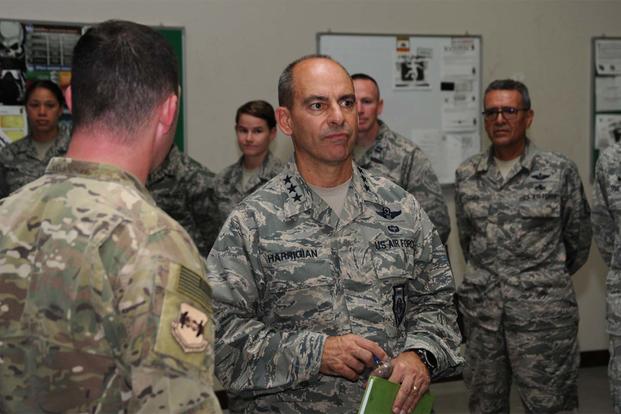The U.S. commander of the air war in Syria and Iraq said Tuesday that he is wary of getting cooperation from Russia and the regime of Syrian President Bashar al-Assad in the tentative "cessation of hostilities" agreement worked out by the State Department.
"Right now, the Russians and the [Syrian] regime have to do the right thing" and live up to the cessation agreement. "I'm not going to tell you that I trust them," said Air Force Lt. Gen. Jeffrey Harrigian, commander of air forces for U.S. Central Command in southwest Asia.
In a briefing to the Pentagon from Southwest Asia, Harrigian said the Russians and the Assad regime must first honor the tentative seven-day "cessation of hostilities" agreed to by Washington and Moscow before the U.S. can begin cooperating with the Russians on joint action against the Islamic State of Iraq and Syria, or ISIS.
Initial reports from the region are that the cessation is generally holding in Syria despite sporadic violations.
Harrigian said "the intelligence community will continue to monitor the cessation" to determine whether to take the next step in working with the Russians, but he appeared to be skeptical. "That is, if we get that far," he said.
Echoing the comments of U.S. ground commanders, Harrigian said that the battlespace in Syria is getting more crowded and complex, with various militias competing for influence and territory in the multi-sided, five-year-old civil war.
Last month, Turkish tanks and troops pushed into Syria on a mission to close off the border to ISIS, but also to limit the influence of the YPG, a Syrian Kurdish militia that has been the most effective partner for the U.S. in Syria.
Harrigian said he was in close coordination with all elements of the U.S. command structure and with anti-ISIS coalition partners on how the deal with the Russians would play out, "but this will take some work."
"As the terms of reference are finalized, we will take the guidance, review it and build an operational plan that executes the mission precisely while minimizing risk to the coalition team and civilians on the ground," said Harrigian, who took over earlier this summer from Lt. Gen. Charles Brown Jr. as the Central Command air commander.
One of his major concerns, Harrigian said, is the Russians' use of so-called "dumb bombs," as opposed to the precision-guided munitions used by the U.S. in airstrikes.
The U.S. has conducted the "most precise air campaign in U.S. history" in Iraq and Syria, Harrigian said. He suggested that coordinating with Russian warplanes using dumb bombs would greatly increase the risk of civilian casualties.
"Our intent is to ensure we don't impact coalition cohesion, our current momentum or the precision effects we demand," Harrigian said. "We're still working out the details, but these are areas that will be addressed."
-- Richard Sisk can be reached at Richard.Sisk@Military.com.
Don't Miss a Single Military.com Story
To read the full article and get exclusive benefits, sign up today.
It’s FREE
Why am I seeing this? Visit our FAQs





























